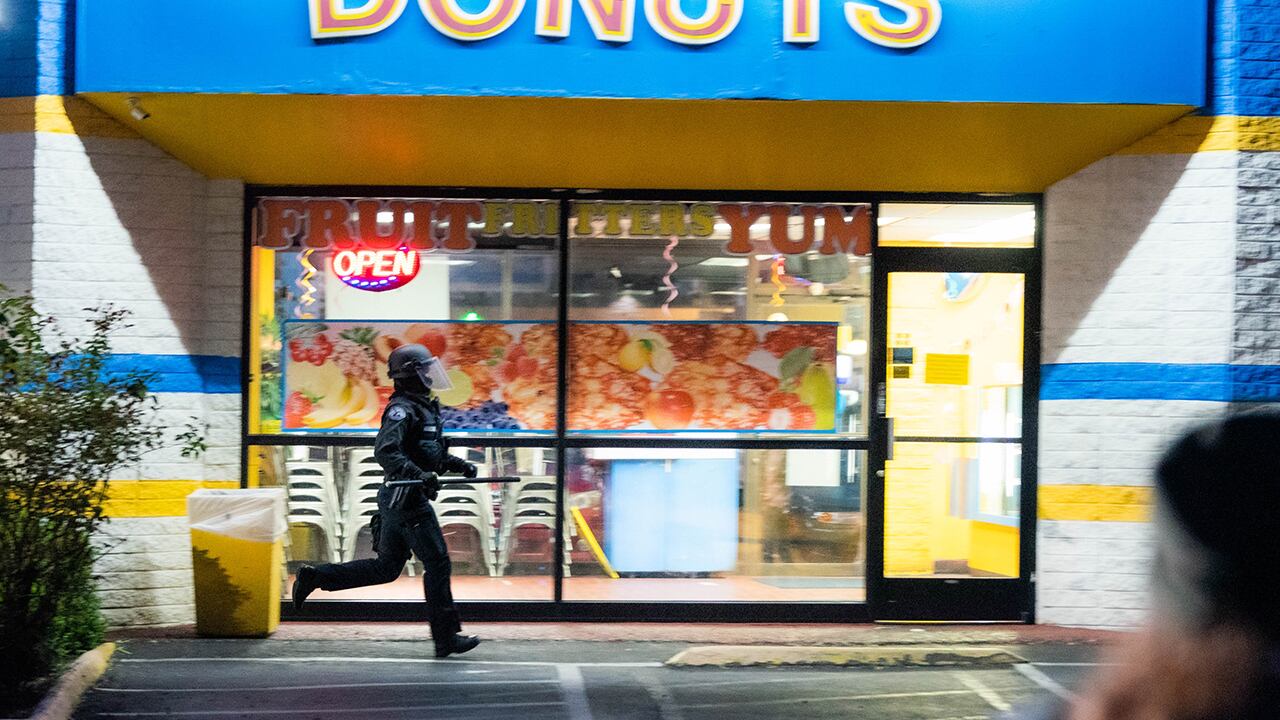On a chilly Monday night last month, a throng of 70 people stood in the center of North Lombard Street, blocking the road. A man clad in all black scrawled "Fuck the Blue" in spray paint on the plywood that covered the headquarters of the Portland Police Association. Portable loudspeakers blared Rage Against the Machine. A line of riot cops awaited the protesters.
Shortly after 9 pm, a car crept around the edge of the crowd. A man in a hoodie and jeans stepped out and walked briskly into a building surrounded by demonstrators. He emerged, wordless, carrying his trophy: a pink box of a dozen fresh doughnuts.
Anthony Abzun says this happens a lot. The night manager of Heavenly Donuts says his customers have accepted a recurring protest outside the shop's doors as a minor obstacle in the pursuit of pastry.
"Some people call ahead to ask if it's safe to come by," Abzun says.
A 24-hour doughnut shop across the street from a police union hall sounds like a stale, lazy joke. But there stands Heavenly Donuts—its blue and yellow paint as bright as frosting, its neon beacon shining all night long, its shelves stacked with glazed old fashioneds, bear claws, and sugar twists. Since 2008, Anthony Abzun's dad, Jose Abzun, has run this Lombard Street shop—one of two locations he owns in Portland.
Starting in July, protesters of police violence fanned out from the downtown courthouses where they clashed with riot cops this summer and began marching to police precincts across the city—a different location each night, with no predictable pattern. Among their targets: the headquarters of the PPA, the Portland Police Bureau's 900-member police union, which negotiates and bargains for cops' wages and benefits.
That means, about twice a month, the glass front windows of Heavenly Donuts offer a panoramic view of theatrical violence: protesters hurling bottles and cans at police, cops slamming protesters onto the concrete, canisters of tear gas spewing toxic clouds.
When the gas hits, the employees of Heavenly Donuts lock the doors. Otherwise? It's business as usual.
"The protesters don't do anything to us, so everything is OK," Jose Abzun says. "We don't like to see the arrests, but there's nothing we can do about it."
In fact, Jose Abzun says, sales increase on protest nights—because protesters buy a lot of bottled water and maple bars.
Five months of regular protests across Portland have created pockets of absurd spectacle, sometimes descending into mayhem. In some places—especially downtown—rage has turned into rioting, and people have smashed shop windows and lit fires. That hasn't happened at Heavenly Donuts. Instead, nightly commerce has persisted, as both protesters and police treat the doughnut shop as neutral territory.
Suzette Smith, a Portland-based freelance reporter who has regularly covered protests on North Lombard, describes Heavenly Donuts as a "little, unshakable pastry-filled Switzerland." Protesters and helmeted photographers regularly patronize the shop, especially to refuel on coffee.
Smith recalls covering a protest in front of the PPA when a gunshot rang out. As she and other reporters took cover behind the Heavenly Donuts building, she peered through the window to see its staff unbothered. They kept working.
"The staff seems largely uninterested in the conflicts," she said. "Their hands are full of doughnut-making duties."
That's how Jose Abzun wants it. He tells his workers to ignore the action and keep baking, stocking and mopping the red-tiled floor.
"We tell the staff to stay out of trouble," he says. "Keep busy."

Jose Abzun has had a long career in the doughnut-making business. He started at Winchell's in Chicago in 1980, after immigrating to the United States from Guatemala in 1979. Winchell's transferred him California, where he became the manager of several stores on the Pacific Coast.
In 2002, he and his business partners bought several Winchell's franchises, including the one on North Lombard Street in Portland. By 2008, they decided to buy out their franchises and rebrand as Heavenly Donuts. Now, he and his business partners own Heavenly Donuts locations in California, Oregon, and Washington.
The Heavenly Donuts in North Portland makes over 14,000 donuts per week.
"This business supports my family," Abzun says. "I wanted to leave something for my sons to take over."
On Sept. 28, his son Anthony took a break from mopping to peer at the arrests outside. As he poked his head out the shop door, a police officer fired a tear gas canister. It landed in front of the door.
Anthony started choking. His eyes burned. He closed the door and tried to ride it out.
"The next day, I still had trouble breathing," he said.
Eventually, the tear gas subsided, and he got back to work when he noticed someone wanted to come in and buy a doughnut. So he opened the other door and sold the customer a maple bar.
Most nights aren't so dramatic. No rioters have shattered Heavenly Donuts' windows. Once, protesters set a fire in the shop's dumpster. On another occasion, in early September, two men in black climbed to the shop's roof and were busy with some project until the police used a long range acoustic device to order them down.
"From what I see, the protesters seem peaceful," Anthony Abzun says. "They're nice to us. We're a minority-owned business."
The only real difference he's noticed at the store? He hasn't seen police officers in the shop for quite some time.
On this October night, Anthony Abzun watched as protesters set fire to a billboard featuring a police union message. But no police showed up. So he kept serving the trickle of black-clad patrons until they decided to go home.
"We want to stay neutral," he says. "We want everyone to be safe."
